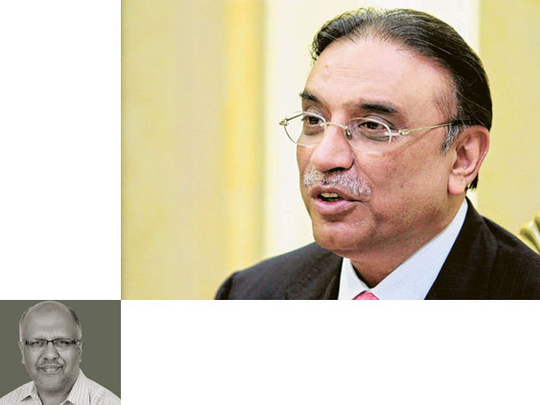
Pakistan’s President Asif Ali Zardari has spent the past week attending the annual session of the United Nations General Assembly in New York, supposedly defending Muslims in the wake of a recent global controversy tied to a private film that originated in the US and which deeply offended Muslims.
Hours before Zardari urged the global community on Friday to refrain from becoming “silent observers and should criminalise such acts that destroy the peace of the world and endanger world security by misusing freedom of expression”, protesters gathered in Islamabad for yet another street demonstration.
Judging by the recent protests, it is clear that while many Pakistanis have chosen to go to the streets, there are no voices to urge calm and restraint in order to continue the protests peacefully. A week ago, on the day of the first such major protest in Pakistan, at least 20 people were reported killed.
The unrest coinciding with such recent events in a country which remains practically leaderless, is just not surprising. In travelling to New York, Zardari has left behind a deeply divided country, confronting one difficult challenge after another. Ironically, while many of his allies consider Zardari as a practically unassailable leader, the weakening of Pakistan under his watch has made the country far more assailable than ever before.
Away from the spotlight attracted by large cities such as Islamabad, dismal conditions across many of Pakistan’s rural areas are a telling reminder of rapidly worsening situation surrounding the grass roots. While Zardari’s regime continues to seek a consolidation of its position, graphic evidence from across Pakistan paints a radically different picture.
For instance, the recent monsoon floods, which have stricken large parts in the south of the populous Punjab province, only continue to add to the mayhem which engulfs the population of that area. Weeks have passed since heavy monsoon rainfall brought widespread destruction to parts of south Punjab. Yet, practically no major mobilisation appears to have taken place to provide emergency relief assistance.
Ironically, Zardari’s overseas trip coinciding with a major calamity in Pakistan, is not without precedent. Two years ago, the Pakistani President refused to cancel a Europe trip in spite of mounting loss of life and property following one of the worst floods in the country in memory. Leaving behind a population which battled large-scale destruction, the president only chose to reinforce his presidency’s character as an uncaring one.
To his critics, Zardari’s overseas trips while Pakistanis battle catastrophes may mean to reinforce an “all-is-well” message. Yet, deep below, Zardari appears driven by political values which have little to do with Pakistan’s future — short, medium or long term.
Elevated to the country’s top job accidentally in 2008 after the tragic assassination of his wife, Benazir Bhutto, the president has chosen to remain in office while disregarding the consequences of a sliding Pakistan. While Pakistanis have increasingly suffered in the past four years of Zardari’s rule, the president appears to show little regard for them.
With this background, it is hardly surprising that the ruling regime is so blatantly obsessed with saving Zardari politically. The past two years have seen key members of the ruling structure rise, time after time, to defend the president from being investigated afresh in Switzerland on accusations of receiving kickbacks from two Swiss companies in the 1990s.
A recent turnaround on this front came about — though apparently more as a result of relentless attacks from the government’s critics than as a genuine change of heart. If indeed Pakistan’s sorry history under President Zardari’s rule offers any guidance, the future is unlikely to be any better.
In the next year, as Pakistan gets all set to head for the next parliamentary elections, Zardari’s relationship with the masses at large will remain unchanged as best. Though well adept at playing power politics and repeatedly forcing his political foes to retreat, Zardari’s ability to turn around Pakistan will remain increasingly in doubt.
President Zardari’s defence of Muslims at the UN General Assembly, though portrayed as an active initiative to emerge as the voice of the people, nevertheless, leaves a significant gap surrounding him. If indeed the Pakistani President expects to be taken more seriously as a credible leader of Pakistan, he needs to go through a significant review which carefully dissects the many controversies surrounding his regime. Tragically, though, it may already be too late in the day to mark a turnaround for what has indeed become Pakistan’s most controversial presidency.
Farhan Bokhari is a Pakistan-based commentator who writes on political and economic matters.










